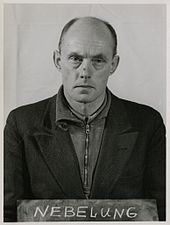Günther Nebelung

Günther Nebelung (born March 24, 1896 in Harlingerode , † February 10, 1970 in Seesen ; also written Günter Nebelung ) was a German lawyer and Senate President at the People's Court .
Life
As the son of a pastor who also worked as a pastoral minister at the Königslutter sanatorium (Klee), he studied law. He was a soldier and prisoner in World War I from 1914 to 1919 . From September 1924 he was established as a lawyer in his law firm in Seesen. In 1928 he joined the NSDAP ( membership number 74,371). A year later he became NSDAP local group leader (OGL) in Eschershausen . He joined the SA in 1930. From 1931 he was active in the Association of National Socialist German Lawyers .
Career in the Nazi state
He was a member of the Landtag (MdL) from 1933. His legal career in the civil service reached a climax in January 1935 when he was appointed President of the Braunschweig Higher Regional Court , where he retained this position until 1944. In July 1944 he was appointed President of the 4th Senate at the People's Court. This senate was responsible for the offense of treason.
Nebelung was one of the most consistent Nazi lawyers, which was also registered by the Nazi leadership. In his reporting work at the OLG Braunschweig, he complained on May 6, 1939 that the judiciary in the Reich was not respected according to its tasks. The judiciary would be the stepchild of III. Rich treats.
He took part in a conference in Berlin on April 23 and 24, 1941, in the House of Fliers , in which reports were made about the destruction of the handicapped by gas in Operation T4 . The participants agreed to maintain silence about these murders. As the influential Senate President of the 4th Senate of the People's Court, he participated in numerous death sentences.
After the Second World War
From June 1945 to June 1948 he was interned with the Allied military authorities. In Nuremberg judges' trial he was indeed charged, but it could be detected any evidence in terms of the charges to a conviction, he that on December 14, 1947 acquitted. The responsible ministry in Lower Saxony no longer wanted to employ him in the judicial service, but he received a pension with the rank of government councilor .
In February 1952 he worked again as a lawyer in Seesen. In January 1967 a judicial investigation was opened against him because he had attended the conference of the Reich Ministry of Justice on legal questions of euthanasia.
He ran his law practice in Seesen until 1964.
literature
- Helmut Kramer (ed.): Braunschweig under the swastika. Bourgeoisie, Justice and Church - A series of lectures and their echo. Magni-Buchladen, Braunschweig 1981, ISBN 3-922571-03-4 .
- Ralph Angermund: German judges 1919-1945. Fischer-Taschenbuch-Verlag, Frankfurt am Main 1991, ISBN 3-596-10238-3 .
- Horst-Rüdiger Jarck , Günter Scheel (Ed.): Braunschweigisches Biographisches Lexikon - 19th and 20th centuries . Hahnsche Buchhandlung, Hannover 1996, ISBN 3-7752-5838-8 , p. 436 .
- Hans-Ulrich Ludewig , Dietrich Kuessner : "So everyone should be warned" - The Braunschweig Special Court 1933–1945. In: Sources and research on the Braunschweig national history. Volume 36, self-published by the Braunschweigisches Geschichtsverein, Langenhagen 2000, ISBN 3-928009-17-6 .
- Lower Saxony State Center for Political Education (Ed.): Justice in National Socialism. Crimes in the name of the people. Exhibition catalog. Nomos Verlag, Baden-Baden 2002, ISBN 3-7890-81787 .
- Ernst Klee : The dictionary of persons on the Third Reich. S. Fischer, Frankfurt am Main 2003, ISBN 3-10-039309-0 .
- Beatrix Herlemann , Helga Schatz: Biographical Lexicon of Lower Saxony Parliamentarians 1919–1945 (= publications of the Historical Commission for Lower Saxony and Bremen. Volume 222). Hahnsche Buchhandlung, Hannover 2004, ISBN 3-7752-6022-6 , p. 257.
- Reinhard Bein : Hitler's Brunswick staff. DöringDruck, Braunschweig 2017, ISBN 978-3-925268-56-4 , pp. 198–203
| personal data | |
|---|---|
| SURNAME | Nebelung, Günther |
| ALTERNATIVE NAMES | Nebelung, Günter |
| BRIEF DESCRIPTION | German lawyer and Senate President at the People's Court |
| DATE OF BIRTH | March 24, 1896 |
| PLACE OF BIRTH | Harlingerode |
| DATE OF DEATH | February 10, 1970 |
| Place of death | Seesen |